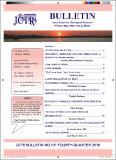| dc.contributor.author | Jesuit Centre for Theological Reflection | |
| dc.date.accessioned | 2020-03-29T14:35:52Z | |
| dc.date.available | 2020-03-29T14:35:52Z | |
| dc.date.issued | 2016 | |
| dc.identifier.issn | 1990-4479 | |
| dc.identifier.other | JCTR BULLETIN NO.107 | |
| dc.identifier.uri | https://repository.jctr.org.zm/handle/20.500.14274/23 | |
| dc.description.abstract | In the last issue we acknowledge the violence in the August general elections. Zambia has
continued to experience pockets of post-election political violence amongst supporters of different
political parties. In some cases,intra-party political violence has continued, rendering ordinary
citizens physically and emotionally marred. The Jesuit Centre For Theological Reflection (JCTR)
takes cognisance of the church’s role in reconciling and reminding the citizenry that violence is not
the way to solve problems.
JCTR held an Ecumenical Theological Reflection Day last October under the theme: “The role
of the church and citizens in reconciling the nation”. In her article on the Ecumenical Theological
Reflection day, Dominica Kabale reports that the lack of initiative to build peace amongst political
actors has had a negative influence on young voters in Universities and Colleges. She reveals
that it is shocking that college students have taken a leaf from happenings in national elections by
refusing to accept student body election results. Some of these students have resorted to mobilising
resources to petition college election results! | en |
| dc.language.iso | en | en |
| dc.publisher | Jesuit Centre for Theological Reflection | en |
| dc.rights | Attribution-NonCommercial-ShareAlike 3.0 United States | * |
| dc.rights.uri | http://creativecommons.org/licenses/by-nc-sa/3.0/us/ | * |
| dc.subject | Investigative Journalism | en |
| dc.subject | Role of the Church | en |
| dc.subject | Reconciliation | en |
| dc.title | JCTR Bulletin 4th Quarter 2016 | en |
| dc.type | Bulletin | en |

